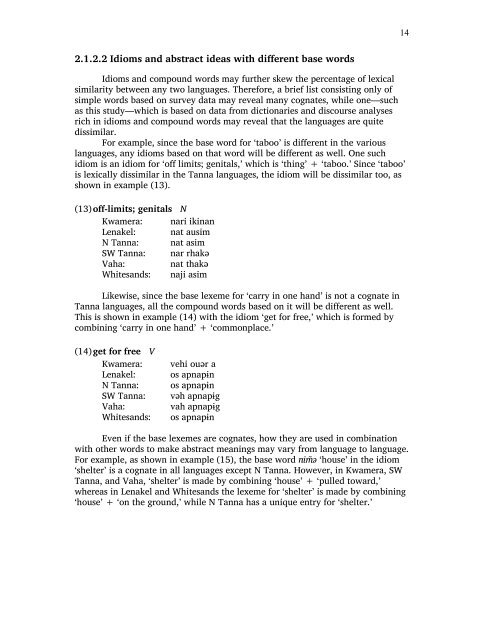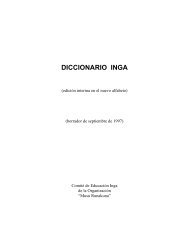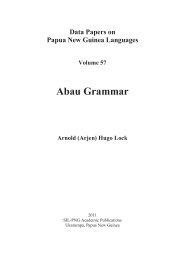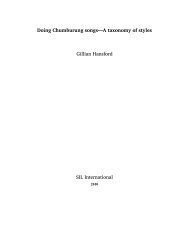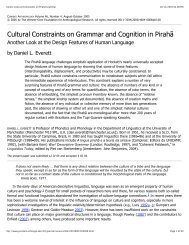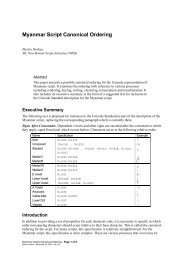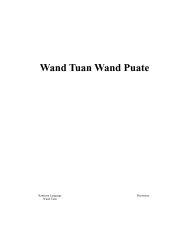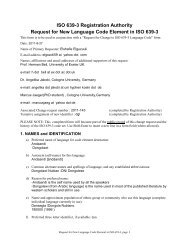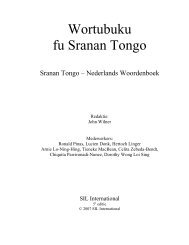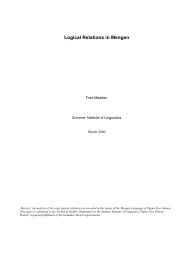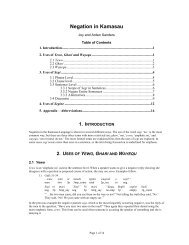- Page 1 and 2: DigitalResources SIL eBook 34 ® A
- Page 3 and 4: SIL e-Books 34 ©2012 SIL Internati
- Page 5 and 6: Section B. Lexicon Appendix A.Nearl
- Page 7 and 8: Abstract Tanna Island in Vanuatu ha
- Page 9 and 10: 1 Section A. Background Chapter 1.
- Page 11 and 12: 3 Map 1. Map of Tanna: Language are
- Page 13 and 14: 5 Compiling comprehensive dictionar
- Page 15 and 16: 7 Table 1.4. Potential errors when
- Page 17 and 18: 9 Table 2.1. Consonant corresponden
- Page 19 and 20: 11 hyphens refer to word-initial, w
- Page 21: 13 (10) show-off N Kwamera: yemamso
- Page 25 and 26: 17 Table 2.4. (Nearly) identical ka
- Page 27 and 28: 19 necessary. Dictionaries in N Tan
- Page 29 and 30: 21 (23) take feces out of intestine
- Page 31 and 32: 23 (27) Kwamera hymn with English t
- Page 33 and 34: 25 There are also variations in how
- Page 35 and 36: 27 Section B. Lexicon. Notes: 1) Ph
- Page 37 and 38: 29 Lenakel: N Tanna: SW Tanna: Vaha
- Page 39 and 40: 31 Whitesands: mɨne anger N kros K
- Page 41 and 42: 33 hips; (5) support oneself with o
- Page 43 and 44: 35 Lenakel: nəuəlɨ* N Tanna: noa
- Page 45 and 46: 37 barren, be V/A no save bonem pik
- Page 47 and 48: 39 be bad tasting V/A See bland, be
- Page 49 and 50: 41 be dried up V/A See dried up, be
- Page 51 and 52: 43 belch; bleat V /INTR sakem win K
- Page 53 and 54: 45 be proud V/A See proud, be be si
- Page 55 and 56: 47 bicker; argue (1) V/TR agu Kwame
- Page 57 and 58: 49 bleed; menstruate V/INTR blad i
- Page 59 and 60: 51 book N See pattern bore a hole V
- Page 61 and 62: 53 branches for birds to nest in N
- Page 63 and 64: 55 Lenakel: əmtətiapɨn N Tanna:
- Page 65 and 66: 57 calm, be (1) V/A See peaceful Va
- Page 67 and 68: 59 carver; hypocrite giaman Kwamera
- Page 69 and 70: 61 Kwamera: əm̃ ai Lenakel: əm̃
- Page 71 and 72: 63 circumcision; penis wrapper; bra
- Page 73 and 74:
65 SW Tanna: Vaha: Whitesands: coar
- Page 75 and 76:
67 coconut leaf torch N See torch m
- Page 77 and 78:
69 SW Tanna: okrig Vaha: oklig† W
- Page 79 and 80:
71 cousin N See cross-cousin; paral
- Page 81 and 82:
73 crash; bash V i kilim Kwamera: L
- Page 83 and 84:
75 SW Tanna: Vaha: Whitesands: crum
- Page 85 and 86:
77 N Tanna: SW Tanna: Vaha: Whitesa
- Page 87 and 88:
79 Kwamera: eivini Lenakel: eanean
- Page 89 and 90:
81 dew; condensation wota blong nae
- Page 91 and 92:
83 disobey V brekem toktok Kwamera:
- Page 93 and 94:
85 Vaha: mak Whitesands: mak See al
- Page 95 and 96:
87 Lenakel: mərh N Tanna: mətu SW
- Page 97 and 98:
89 easy; slow; gentle; easily; slow
- Page 99 and 100:
91 ramaklah N Tanna: nɨki* tatəkl
- Page 101 and 102:
93 karemaot long graon Kwamera: Len
- Page 103 and 104:
95 Vaha: Whitesands: faint V ae i b
- Page 105 and 106:
97 SW Tanna: Vaha: Whitesands: See
- Page 107 and 108:
99 fire faea Whitesands: apə See a
- Page 109 and 110:
101 Whitesands: noanao †fr. Bis.
- Page 111 and 112:
103 flood N bigfala wota Kwamera: L
- Page 113 and 114:
105 fork in the road N rod i seraot
- Page 115 and 116:
107 Vaha: Whitesands: təm rɨm Vah
- Page 117 and 118:
109 N Tanna: koko SW Tanna: koko Va
- Page 119 and 120:
111 go around (1) V/INTR See happen
- Page 121 and 122:
113 Lenakel: rɨp* N Tanna: tɨp̃
- Page 123 and 124:
115 Kwamera: əjai Lenakel: əjai N
- Page 125 and 126:
117 Lenakel: nɨpkəlu* N Tanna:
- Page 127 and 128:
119 have diarrhea (2) See run V hav
- Page 129 and 130:
121 Kwamera: kum̃ er, kurpəs Lena
- Page 131 and 132:
123 hillside N saed blong wan hil K
- Page 133 and 134:
125 Hong Kong taro (Xanthosoma sagi
- Page 135 and 136:
127 N Tanna: osiəhau atɨp SW Tann
- Page 137 and 138:
129 Kwamera: uvnihi, əghan Lenakel
- Page 139 and 140:
131 interpret (1) V eksplenem Kwame
- Page 141 and 142:
133 Kwamera: Lenakel: N Tanna: SW T
- Page 143 and 144:
135 lastborn N lasbon Kwamera: kwə
- Page 145 and 146:
137 Whitesands: nelk* See also (1)
- Page 147 and 148:
139 Linckia laevigata N See blue st
- Page 149 and 150:
141 look like s.o. or s.th. V/TR Se
- Page 151 and 152:
143 make s.th. level V See spread o
- Page 153 and 154:
145 Lenakel: əwai-əwai N Tanna: a
- Page 155 and 156:
147 midget; mythical dwarf N sotfal
- Page 157 and 158:
149 morning star N moning sta Kwame
- Page 159 and 160:
151 murmur V/INTR See hum muscle al
- Page 161 and 162:
153 need V See love V nettles N See
- Page 163 and 164:
155 nundei, sidaon long ples we san
- Page 165 and 166:
157 Kwamera: narɨs Lenakel: noanea
- Page 167 and 168:
159 orgasm, have an V See have sexu
- Page 169 and 170:
161 Kwamera: təpag* Lenakel: təpa
- Page 171 and 172:
163 Vaha: Whitesands: †See scoope
- Page 173 and 174:
165 Lenakel: N Tanna: SW Tanna: Vah
- Page 175 and 176:
167 Vaha: Whitesands: hu arfwəi pl
- Page 177 and 178:
169 pour liquid out of s.th. V/TR k
- Page 179 and 180:
171 N Tanna: SW Tanna: Vaha: Whites
- Page 181 and 182:
173 Kwamera: Lenakel: N Tanna: SW T
- Page 183 and 184:
175 quiet, be V/INTR See stop cryin
- Page 185 and 186:
177 Vaha: Whitesands: ətəuatəu
- Page 187 and 188:
179 reveal V talemaot bakgraon Kwam
- Page 189 and 190:
181 roll up s.th. (1), such as a ma
- Page 191 and 192:
183 Whitesands: See also chief yerm
- Page 193 and 194:
185 Vaha: Whitesands: kɨsətu əht
- Page 195 and 196:
187 Lenakel: N Tanna: SW Tanna: Vah
- Page 197 and 198:
189 Kwamera: əvriwe Lenakel: əvra
- Page 199 and 200:
191 sharpen s.th. V/TR See cut s.th
- Page 201 and 202:
193 See also (1) hit the bull’s e
- Page 203 and 204:
195 N Tanna: əni SW Tanna: əni Va
- Page 205 and 206:
197 slave (1) N slef Kwamera: yo tu
- Page 207 and 208:
199 Whitesands: təkaku See also ka
- Page 209 and 210:
201 Lenakel: aunɨpɨn N Tanna: emk
- Page 211 and 212:
203 spill out of the mouth, not all
- Page 213 and 214:
205 spread out s.th.; make s.th. le
- Page 215 and 216:
207 Whitesands: məhau See also (1)
- Page 217 and 218:
209 N Tanna: nəvitok SW Tanna: nə
- Page 219 and 220:
211 N Tanna: SW Tanna: Vaha: Whites
- Page 221 and 222:
213 Kwamera: meri Lenakel: mɨt N T
- Page 223 and 224:
215 N Tanna: nəu SW Tanna: nɨkwə
- Page 225 and 226:
217 TB N See hunger (3) teeth, gnas
- Page 227 and 228:
219 Vaha: kap̃əliu Whitesands: r
- Page 229 and 230:
221 third person dual object pronou
- Page 231 and 232:
223 throw s.th. by flicking of the
- Page 233 and 234:
225 tomorrow ADV tumora Kwamera: r
- Page 235 and 236:
227 Vaha: Whitesands: †See lead t
- Page 237 and 238:
229 N Tanna: noekoeko SW Tanna: nar
- Page 239 and 240:
231 two NUM tufala Kwamera: kəru L
- Page 241 and 242:
233 SW Tanna: ətawə Vaha: asə Wh
- Page 243 and 244:
235 volition (2) N See inside of s.
- Page 245 and 246:
237 wart N strongskin Kwamera: Lena
- Page 247 and 248:
239 SW Tanna: əvəvhao Vaha: əvə
- Page 249 and 250:
241 which REL See that; which while
- Page 251 and 252:
243 Kwamera: nətaan Lenakel: — N
- Page 253 and 254:
245 Lenakel: N Tanna: SW Tanna: Vah
- Page 255 and 256:
247 wounded, be (2) i soa Kwamera:
- Page 257 and 258:
249 SW Tanna: Vaha: Whitesands: you
- Page 259 and 260:
251 Appendix A.Nearly identical lex
- Page 261 and 262:
253 Appendix B. Birds of Vanuatu in
- Page 263 and 264:
255 Abbreviations The table below l
- Page 265 and 266:
257 Lynch, John, and Terry Crowley.


